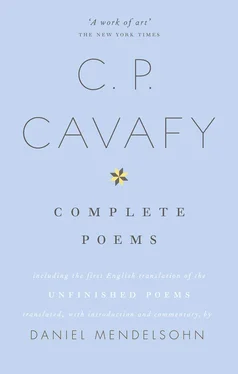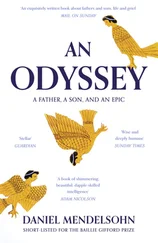Indeed, it is no accident that Cavafy himself dated this period to the year 1911—the year in which he published “Dangerous,” the first of his poems that situated homoerotic content in an ancient setting. Nor is it a coincidence that the subject of this poem is a Syrian student living in Alexandria during the uneasy double reign of the sons of Constantine the Great, Constans and Constantius, in the fourth century A.D., at the very moment when the Roman Empire was segueing from paganism to Christianity. As if profiting from that uncertain moment, and reflecting it as well, the young man feels emboldened to give bold voice to illicit urges:
Strengthened by contemplation and study,
I will not fear my passions like a coward.
My body I will give to pleasures,
to diversions that I’ve dreamed of,
to the most daring erotic desires,
to the lustful impulses of my blood, without
any fear at all.
Both the setting and the character are typical of what George Seferis described as the characteristic Cavafian milieu: “the margins of places, men, epochs … where there are many amalgams, fluctuations, transformations, transgressions.” (The reader of his poems would, indeed, do well to observe how often, and how strikingly, we encounter the vocabulary of indirect placement—“nearby,” “in front of,” “by,” “next to,” “on the side”—in these poems. The titles alone of many betray this preoccupation with the edges of spaces: “In the Entrance of the Café,” “The Mirror in the Entrance,” “On the Outskirts of Antioch.”) As he neared the age of fifty, Cavafy had at last found a way to write, without shame, about his desire—a way that suggestively conflated the various margins to which he had always been drawn: erotic, geographical, spatial, temporal.
The painfully achieved reconciliation of Gibbon’s eighteenth-century, Enlightenment view of history and Paparrigopoulos’s nineteenth-century, Romantic national feeling, coupled with a startlingly prescient twentieth-century willingness to write frankly about homosexual experience, made possible the “unique tone of voice,” as the admiring Auden described it, that is the unmistakable and inimitable hallmark of Cavafy’s work. Ironic yet never cruel, unsurprised by human frailty, including his own (“Cavafy appreciates cowardice also,” Forster wrote, “and likes the little men who can’t be consistent or maintain their ideals”), yet infinitely forgiving of it, that tone takes its darker notes from the historian’s shrewd appreciation for the ironies of human action (which inevitably result, as did the life-altering business misfortunes of his father and uncles, from imperfect knowledge, bad timing, missed opportunities, or simply bad luck); yet at the same time is richly colored by a profound sympathy for human striving in the face of impossible obstacles. (Which could be the armies of Octavian or taboos against forbidden desires.) And it is inflected, too, by the connoisseur’s unsparing and unsentimental grasp of both the pleasures and the pain to which desire makes us vulnerable.
That appreciation, that sympathy, that understanding are, of course, made possible only by Time—the medium that makes History possible, too. As I have said, for many readers, even sophisticated ones, Cavafy is a poet who wrote essentially two kinds of poems: daringly exposed verses about desire, whose frank treatment of homoerotic themes put them decades ahead of their time—and make them gratifyingly accessible; and rather abstruse historical poems, filled with obscure references to little-known and confusingly homonymous Hellenistic or Byzantine monarchs, and set in epochs that one was never held responsible for learning and places that fringed the shadowier margins of the Mediterranean map. But to divide the poet’s work in this way is to make a very serious mistake: Cavafy’s one great subject, the element that unites virtually all of his work, is Time. His poetry returns obsessively to a question that is, essentially, a historian’s question: how the passage of time affects our understanding of events—whether the time in question is the millennia that have elapsed since 31 B.C., when the Hellenophile Marc Antony’s dreams of an Eastern Empire were pulverized by Rome (the subject of seven poems), or the mere years that, in the poem “Since Nine—,” have passed since those long-ago nights that the narrator spent in bustling cafés and crowded city streets: a space of time that has since been filled with the deaths of loved ones whose value he only now appreciates, sitting alone in a room without bothering to light the lamp. What matters to Cavafy, and what so often gives his work both its profound sympathy and its rich irony, is the understanding, which as he knew so well comes too late to too many, that however fervently we may act in the dramas of our lives—emperors, lovers, magicians, scholars, pagans, Christians, catamites, stylites, artists, saints, poets—only time reveals whether the play is a tragedy or a comedy.
The references to long-vanished eras, places, and figures that we so often find in Cavafy’s poetry, and which indeed are unfamiliar even to most scholars of Classical antiquity, are, for this reason, never to be mistaken for mere exercises in abstruse pedantry. Or, indeed, for abstruseness at all. A poem’s casual allusion to, say, the autumnal thoughts of the Byzantine emperor Manuel Comnenus in the year 1180 functions quite differently from the way in which invocations of arcane material can function in (to take the well-known example of a contemporary) The Waste Land of T. S. Eliot—where the self-consciously rarefied quality of the numerous allusions is part of the texture of the poem, part of its Modernist project. Cavafy, by contrast, may be said simply to have inhabited his various pasts so fully that they are all equally present to him. Not for nothing are a striking number of his poems about nocturnal apparitions of those who have vanished into history. In “Caesarion,” for instance, a poem written in 1914 and published in 1918—the intervening years, the years of the Great War, saw the publication of a number of poems on beautiful dead youths—the beautiful (as he imagines) teenage son of Caesar and Cleopatra materializes one night in the poet’s apartment:
Ah, there: you came with your indefinite
charm …
. . . . . . . . . . . . . . . . . . . . . . . . . . .
And I imagined you so fully
that yesterday, late at night, when the lamp
went out—I deliberately let it go out—
I dared to think you came into my room,
it seemed to me you stood before me.
Such apparitions do not always belong to the distant past. In “Since Nine—,” published in 1918 and written the year before, an “apparition” of the poet’s own “youthful body” suddenly materializes in front of him one evening as he sits alone in a darkened room; similarly, in an Unfinished Poem of the same period, first drafted in 1919 and bearing the provisional title “It Must Have Been the Spirits,” the poet’s own soul appears in the form of a louche youth on a street in Marseille, a place he’d visited years before—this scene replacing a decor that is itself a suggestive mélange of past and present (a commonplace settee, a piece of Archaic Greek statuary). Although in the latter poem the narrator attributes his supernatural vision to the excess of wine he’d drunk the previous night—hence the title—such apparitions are, therefore, hardly anomalous in his creative life, and symbolize a crucial theme of the entire body of work: the presence of the past in our own present. To Cavafy, figures such as those of the dead princeling and his own youthful self all inhabit the same era—the vastly arcing past that his own imagination inhabited so fully—and were therefore as alive and present to him as the whores who lived in the brothel below his apartment on the Rue Lepsius. (“Where could I better live?” he once remarked, in the worldly tone we recognize from his verse. “Under me is a house of ill repute, which caters to the needs of the flesh. Over there is the church, where sins are forgiven. And beyond is the hospital, where we die.”) It is the responsibility of the reader to inhabit that past as fully as possible, too, if only during the brief space during which he or she explores these poems. Otherwise, the meaning of many of them will be obscure, if not opaque. And the reader who, put off by that opacity, seeks out the contemporary poems while skipping over the historical poems, is missing the point of Cavafy’s work—is, like so many of his characters both real and imagined, mistaking the clouded part for the clear and illuminating whole.
Читать дальше












